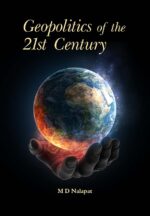-
Geopolitics of the 21st Century
₹1,900.00Author: M D Nalapat
The war in Ukraine has once again brought to the forefront the interconnectedness of countries to one another. Supply chains and markets have become global, and the need to ensure price and quality competitiveness on the part of manufacturers, service providers, and producers has meant increasing reliance among countries for sourcing items essential to their own economies. The consequence of such interdependence has resulted in the intersection of geopolitics with several aspects of our lives. Our societies are more closely connected than ever before. While there have been instances of peaceful coexistence, tensions within and between countries have multiplied and, at times, have erupted into open conflict. Understanding the ebb and flow of events within countries has become essential in comprehending global factors which affect our lives. This book provides an insight into significant dynamics of our time, and what they might lead us to.
Interested overseas customers may write to us at mup@manipal.edu about purchasing the book.
-
The Practice of Geopolitics
₹850.00Author: M D Nalapat
Intended to be a Practioner’s Guide to Geopolitics, the book provides a look into the thought processes that generate correct and timely analysis of global events. Geopolitics needs to weave within its analytical grasp economics, society, strategy and even culture, as the science deals with overall national capabilities as well as the mutal synergy and frictions between nations. Although a broad range of subjects has been covered in the book, each is anchored in the ground reality of events having a profound impact on the lives of citizens and on world events. The growing interconnectedness of the globe has resulted in a need to do away with the popular west centric models of international relations and to view events not through that single prism but from a holistic viewpoint that accepts the relevance and maturity of different histories and geographies. What the book provides is an alternative Weltanschauung to the dominant models of geopolitical analysis, so that the science is enabled to cross beyond the narrow boundaries which have confined. The scope and applicability of its analysis. The rise of Asia needs a geopolitical vision unique to the continent, and this is what has been provided by Professor Nalapat.
Interested readers may write to us at mup@manipal.edu about purchasing the book.


